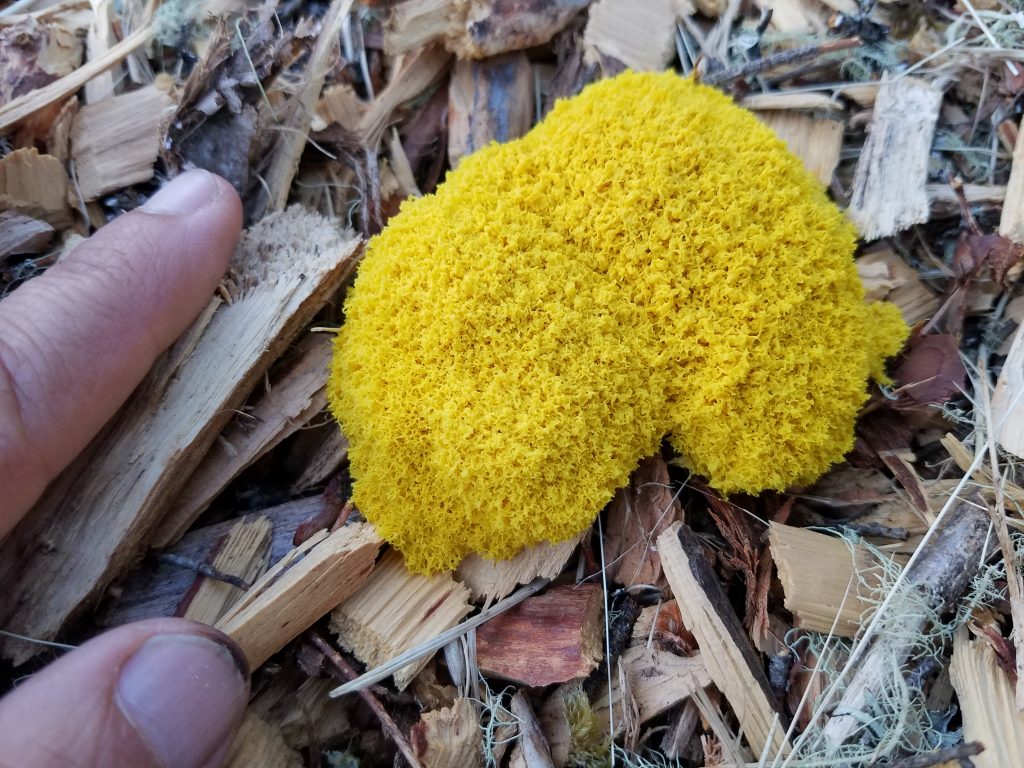Melrose, OR–June 25, 2017. Haha! These names crack me up (!), but they are quite descriptive of the appearance of this stage of the organism(s) under consideration here. My son Daniel came up with his name: “Sponge Bob’s Brain,” which I think should be considered at the next international convention of slime mold taxonomists. 🙂 But enough fun with names….
I want to present a few photos that show the two colors of slime mold that I have had in my area of wood chips, and both fresh (wet) and dry versions of the same blobs, the fresh ones in the morning, and the dry ones in the afternoon. Following is my June sequence of observations:
2017 June 24
Early in the morning on my way to my car I noticed this dried up … something … I took photos of the specimen intact (as I found it) as well as with a portion scraped away to reveal the inside:
http://www.inaturalist.org/observations/6779047
After photographing the above dried up specimen, I immediately noticed a couple other blobs, one a creamy color and the other bright yellow. At first, because they both appeared to me to be slime molds, and they basically looked the same except for the color, I just put them in the same iNat observation. However, I subsequently separated them into the two following observations:
Creamy–http://www.inaturalist.org/observations/6779382
Yellow–http://www.inaturalist.org/observations/6779379
When I came home this same day in the afternoon, I noticed that what were moist blobs in the morning were now mostly dried up, like the first specimen I noticed this morning.
Creamy–http://www.inaturalist.org/observations/6819532
Yellow–http://www.inaturalist.org/observations/6819531
2017 June 25
After reading up on slime molds a bit, I decided to do something a little more experimental. So on this morning, I went out and found some new fresh specimens, both yellow and cream, and marked them relative to a (Pacific madrone) leaf on which I wrote either “cream” or “yellow.” Then I came back later in the day and took photos again. Both when the specimens were wet and when they were dry, I took a little scrape of the blob to expose the interior. Following are links to the morning and evening observations:
Morning:
Creamy–http://www.inaturalist.org/observations/6805101
Yellow–http://www.inaturalist.org/observations/6805093
Evening:
Creamy–http://www.inaturalist.org/observations/6805216
Yellow–http://www.inaturalist.org/observations/6805219
Looking just at these few observations, it appears to me that the yellow specimens dried a bit slower, ended up not as black or hard in the middle, and did not turn as white on the surface, while the creamy specimens dried more quickly, ended up harder (more dense) in the middle, and overall more white.
So, perhaps these are different species? Or different morphs of the same species? Or perhaps “species” is not a relevant term for slime molds? I don’t know. 🙂 I would appreciate any input in on these specimens, or anything I can do (look at something under a microscope?) to find out more.
If I take more photos of these slime molds in this patch of wood chips, I’ll post links here.
